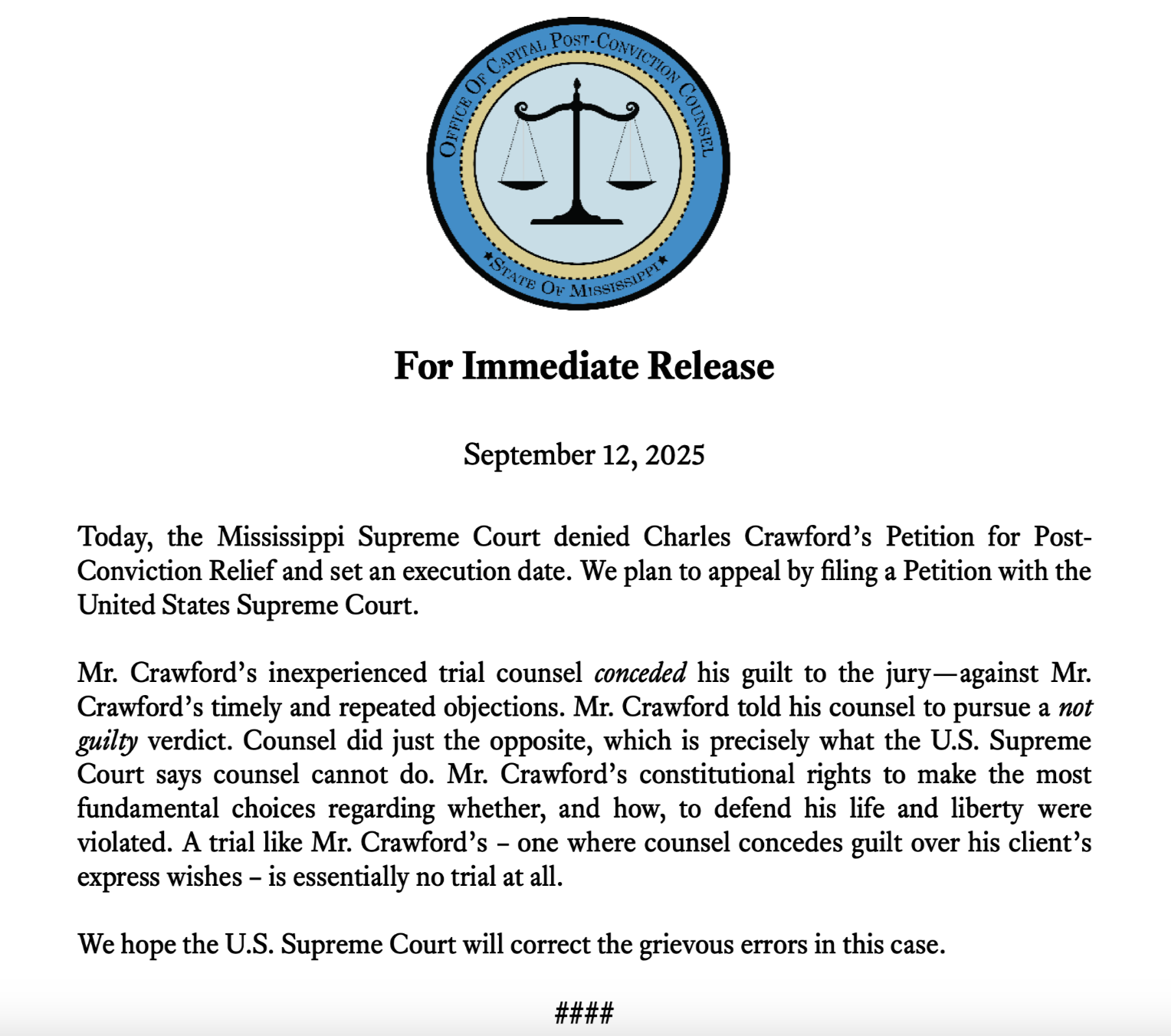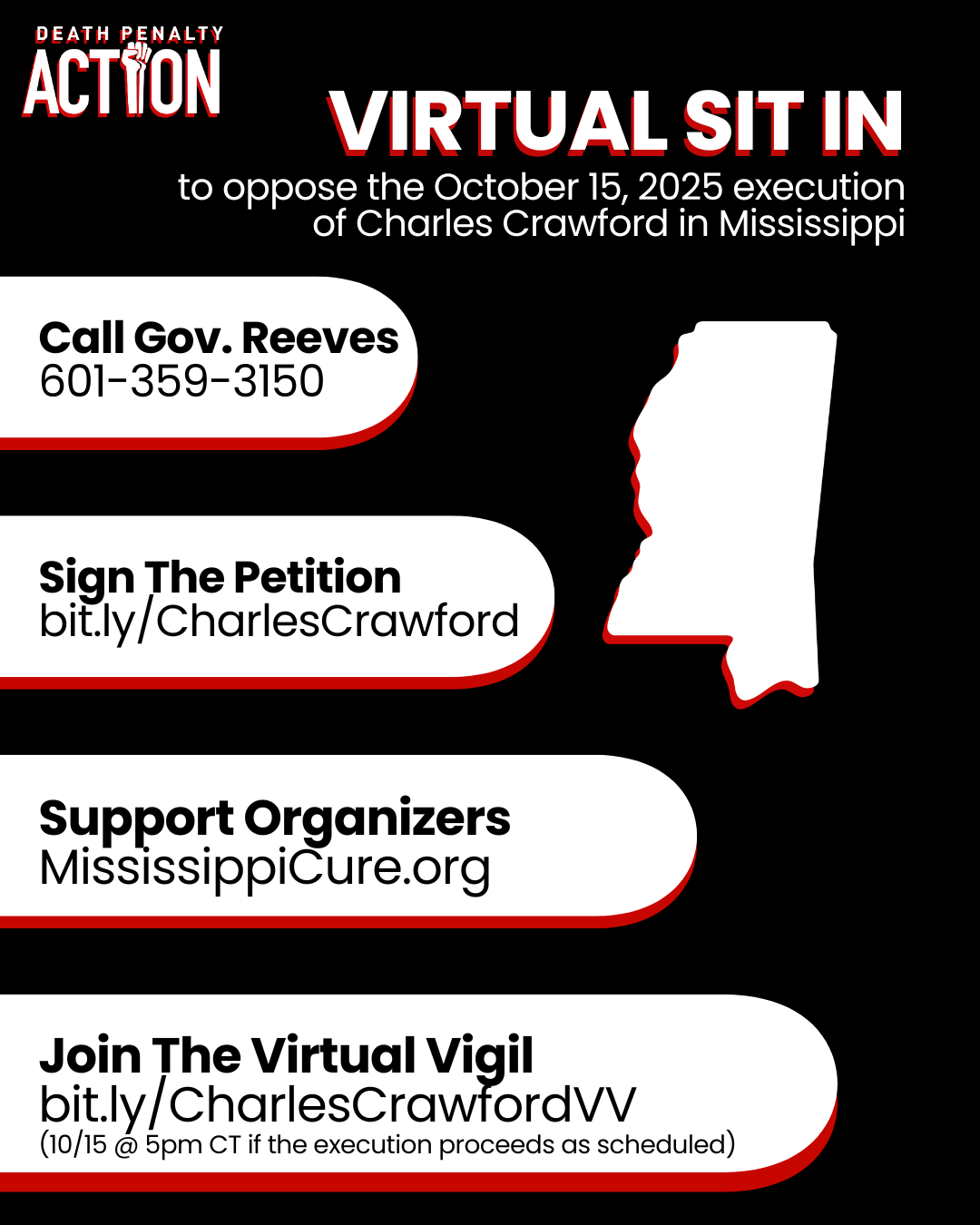Stop the Execution of Charles Crawford in Mississippi
Governor Tate Reeves
-2.png)
Despite a grossly unfair and unconstitutional trial, the State of Mississippi plans to execute Charles Crawford at 6pm CT on October 15, 2025 for the 1993 kidnapping and killing of 20-year old Kristy Ray.
In Charles Crawford’s case, everyone from the officers to the prosecutors, to the expert witnesses, to the Court trampled on – instead of protected – his core constitutional rights. Most shockingly, the worst offenders were his own attorneys.
Before trial, Crawford wrote his appointed trial counsel about the need for investigation and discovery, reasonable doubt, and the expectation that he would be found not guilty. Counsel thus knew before trial that Crawford did not want any concession of guilt, and he did not want his lawyers to pursue an insanity defense. Even so, once trial began, Crawford’s counsel immediately conceded guilt—and continued to do so for the duration of trial. Given Crawford’s lawyers confessed his guilt throughout trial, over his objections, it is no surprise that Crawford was convicted of capital murder and sentenced to death.
 In McCoy v. Louisiana, 584 U.S. 414 (2018), the U.S. Supreme Court made clear that a defense attorney may not override a client’s clear wishes and admit his guilt during a trial. As in McCoy, counsel’s confession of guilt eviscerated Crawford’s constitutional entitlement to decide upon the objectives of representation by counsel.
In McCoy v. Louisiana, 584 U.S. 414 (2018), the U.S. Supreme Court made clear that a defense attorney may not override a client’s clear wishes and admit his guilt during a trial. As in McCoy, counsel’s confession of guilt eviscerated Crawford’s constitutional entitlement to decide upon the objectives of representation by counsel.
When the accused in a criminal proceeding chooses to defend against the charges rather than admit guilt, the U.S. Constitution does not allow his lawyer to override that choice. It is the accused’s liberty—and, in capital cases, his life—at stake in a criminal prosecution. A trial like Crawford’s – one where counsel concedes guilt and pursues an unwanted insanity defense – is essentially no trial at all. The U.S. Constitution demands that Crawford receive a new trial.
Charles Crawford, his family, and his friends hope the United States Supreme Court will hear his case. Crawford is a son, a brother, a father, a grandfather, and a friend to so many. He is a model inmate in prison, who is trusted with working in and outside the building where he is housed. Crawford is steady in his faith in God, and he daily shows an uplifting strength. He deserves the fair trial he never received.
Charles Crawford - in his own words...
Join the Virtual Sit In
Call Governor Reeves at 601-359-3150 with the following message:
"Hi. My name is [your name]. I am calling request that Gov. Reeves halt the 10/15 execution of Charles Crawford. His constitutional rights were violated at trial and he should, at the very least, have a new and fair trial. Thank you."
REGISTER FOR THE VIRTUAL VIGIL BEGINNING AT 5PM CT ON 10/15.
Mississippi's plan to carry out an execution marks the state as an outlier in national use of the death penalty. The vast majority of states with capital punishment continue on a downward trend of executions, with only a handful of (almost exclusively Southern) states having had carried out executions in the last few years. Mississippi is going against evolving standards of decency and human rights by scheduling an execution date.
Please sign the petition asking Governor Reeves to do everything within his power to stop this execution, including issuing a stay, and seeking a path to clemency in the case.
Sponsored by
To:
Governor Tate Reeves
From:
[Your Name]
We are writing to ask that you to stop the planed October 15, 2025 execution of Charles Crawford for the 1993 kidnapping and killing of 20-year old Kristy Ray.
In Charles Crawford’s case, everyone from the officers to the prosecutors, to the expert witnesses, to the Court trampled on – instead of protected – his core constitutional rights. Most shockingly, the worst offenders were his own attorneys.
Before trial, Crawford wrote his appointed trial counsel about the need for investigation and discovery, reasonable doubt, and the expectation that he would be found not guilty. Counsel thus knew before trial that Crawford did not want any concession of guilt, and he did not want his lawyers to pursue an insanity defense. Even so, once trial began, Crawford’s counsel immediately conceded guilt—and continued to do so for the duration of trial. Given Crawford’s lawyers confessed his guilt throughout trial, over his objections, it is no surprise that Crawford was convicted of capital murder and sentenced to death.
In McCoy v. Louisiana, 584 U.S. 414 (2018), the U.S. Supreme Court made clear that a defense attorney may not override a client’s clear wishes and admit his guilt during a trial. As in McCoy, counsel’s confession of guilt eviscerated Crawford’s constitutional entitlement to decide upon the objectives of representation by counsel.
When the accused in a criminal proceeding chooses to defend against the charges rather than admit guilt, the U.S. Constitution does not allow his lawyer to override that choice. It is the accused’s liberty—and, in capital cases, his life—at stake in a criminal prosecution. A trial like Crawford’s – one where counsel concedes guilt and pursues an unwanted insanity defense – is essentially no trial at all. The U.S. Constitution demands that Crawford receive a new trial.
Charles Crawford, his family, and his friends hope the United States Supreme Court will hear his case. Crawford is a son, a brother, a father, a grandfather, and a friend to so many. He is a model inmate in prison, who is trusted with working in and outside the building where he is housed. Crawford is steady in his faith in God, and he daily shows an uplifting strength. He deserves the fair trial he never received.
We are concerned that while the vast majority of states with capital punishment continue on a downward trend of executions, Mississippi is going against the trend by scheduling executions.
We, the undersigned, ask that you do everything within your power to stop this execution, including issuing a stay, and seeking a path to clemency in the case.
Thank you for your time and attention to this urgent and serious matter.
